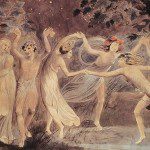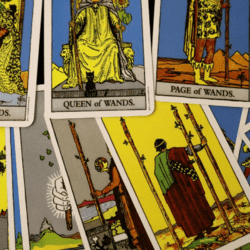It was a sunny day and I was immersed in the satisfying work of harvest. The heat of the day was starting to come on and I had taken off my waterproof boots. I wanted to feel the cool soil under my feet as I picked beans. My farming mentor told me to always pick beans when they’re dry. If there’s dampness or dew on them it can spread a disease called rust. So I had harvested the lettuces and the cucumbers first. The children were playing in the field next to the garden and suddenly the tempo and timber of their voices changed. The clustered around something and called for me, “Mom!”
The cat had caught a bird. It was a male cardinal, bright red and fluttering on the ground. I will spare you the details, dear reader, but he had moved past the point of being nursed back to health, though he still struggled. The children watched in fascination and horror as he attempted to escape. I stared down at that tiny being and my heart ached for its futile struggle. I needed to get back to the beans and the carrots, and yet, I kept watching.
My cat is a lovely being. No insult to my previous cats, now passed on, but I think he might be the best cat I’ve ever had. He is cuddly, good at catching mice, and patient with children and babies. But this too is part of his nature, this need to hunt and kill. As pagans we honor the Hunter as well as the hunted. This is part of nature and I must accept the cycle of life and death if I want to be an honest worshipper of the Earth, but I did not want the bird to struggle any more than he already had. So I lifted him gently into a bucket and carried him to the back hill where I have my altar to the ancestors. I placed him on a stump and with careful and strong determination found a rock and ended his life. It is what I think he would have wanted if I had been able to ask him.
I killed as an act of compassion.

Compassion is much talked about in many religions, but I have found our pagan ones often silent on this front. Especially those that focus on reconstruction of the ancient pagan ways seem to look to different virtues for guidance. We have made such progress in finding the face of femininity in our divinity, though we struggle with what it means, many of us embrace the material world, sensuality, and joy in our bodies as part of our religious experience. I think that these things are truly gifts that we are giving not only to ourselves but to the larger community of religions as well.
I don’t think our work is nearly done.
As ADF Druids we are delving deep into the past and using those strands spun together with science and modern knowledge to make something new that echoes the old. We have so much yet to learn and discover. We’ve uncovered the concepts of *ghosti and *xartus – both come from this research and lead us to understand the deep spirituality that our ancient ancestors had.
I would say that compassion is a Good Thing. It’s been shown that cultivating compassion makes people happier, better leaders, and obviously, it helps those who are the recipient of the compassion as well. However I think that as a religion we have been missing the boat on compassion. I have seen many times where compassion would have been a real aid to interpersonal interaction in both leadership issues as well as daily struggles with grove and larger pagan community building.
We’ve released our inner warriors and transformed our selves in the fire and the water. We have mysteries and wisdom, but do we have compassion?
So I went in search of the strands of compassion. I wasn’t sure I would find them, but I did.
Compassion literally means suffering with or co-suffering. In fact Patheos -the very name of this site- comes from the same Greek root word for suffering. So compassion is an action of feeling. It is a state of mind, a willingness to be in relationship with someone in difficulty or someone that feels badly. I began my search with the Vedas because of their geographic connection with Buddhism, a religion that is known for a focus on compassion. The Vedas also connect back to European religious traditions through language and culture. Those wandering Indo-Europeans traveled all over the Eurasian continent. You can imagine them a little like traveling gypsies meets Khal Drogo.
Interestingly we find in the Upanishads, an ancient Vedic text, that there are three words that were given to the Gods, Men, and Demons by Prajāpati, the God in Charge. These words were Dāma Daya and and Dana, which translated as restraint generosity and compassion. The three were seen to be a set of instructions that were all related and given to the different groups of beings as per their needs.
We could do a lot worse than to embody restraint, generosity and compassion.
Here’s an excerpt from the RgVeda from a hymn to Dana or generosity x.117.3, 5:
He is the liberal man who helps the beggar
That, craving food, emaciated wanders,
And coming to his aid, when asked to succor,
Immediately makes him a friend hereafter.The wealthier man should give unto the needy,
Considering the course of live hereafter;
For riches are like chariot wheels revolving:
Now to one man they come, now to another.
The RgVeda was created over a period of time about 1500 BCE. Generosity has been around for a very long time. But we already knew that Compassion is an important part of the Eastern religious traditions. Do we find it in European indigenous religion as well?
Reading the Havamal is worth doing if just for the experience of culture that it gives. It speaks at length about friendship and how to be both a good host and a good guest. It feels much harsher than the Vedas. This is a culture where betrayal is a real possibility, violence is a given, and true friendship is rare and dear.
Havamal 41:
Vápnum ok váðum Friends must gladden each other
skulu vinir gleðjask with weapons and clothes,
þat er á sjalfum sýnst which are most evident on themselves.
viðr gefendr ok endrgefendr givers in return and repeat-givers
erusk vinir lengst, are friends the longest
ef þat bíðr at verða vel if it endures to turn out well.Havamal 48:
Mildir frœknir Generous, valiant
menn bazt lifa men live best,
sjaldan sút ala and seldom nourish sorrow;
en ósnjallr maðr but the cowardly man
uggir hotvetna fears all sorts of things
sýtir æ gløggr við gjöfum and the stingy man is always troubled about gifts.
Even in a world where food is scarce and violence is common it is a given that generosity and sharing is important. But what about compassion? Is there evidence for the importance of sharing of suffering?
Yep. I found it. Or rather, her.

The wife of Loki, a goddess of the Aesir who married a trickster descended from Jotuns. She who holds the bowl that catches the venom dripping from the Skadi’s snake onto Loki bound in the bowels of the earth. There’s evidence in other indigenous European cultures as well, but for today I want to finish with Sigyn Victory Woman. I first began to think about her when I bought Sigyn: Lady of the Staying Power by Galina Krasskova. Last winter I organized a Druid Moon ritual for Sigyn and retold the story of her loss and devotion. I’ve known a lot of people who dislike this particular myth. The story of how her children were killed and her husband captured and bound; the choice that she made to stay with him in the darkness and alleviate his pain. I’ve heard it said that she was clearly abused, or co-dependant. That she had lost her mind. That she was a horrible example of liberated womanhood. But it was her choice. She chose to stay and share suffering. She showed compassion.
People seem to react badly to her choice. But I think there is power in that choice. It’s not a big fancy power. It’s not the ability to see the future or save the world like Odin. It’s not even the power to grow apples of immortality like Idunn. It’s the power to help. I think that’s why it makes people so uncomfortable. Unlike so many other stories in the Eddas the solution is not to apply a giant hammer or trick someone with cleverness. It’s just about doing boring work. She’s the Cinderella of Norse Mythology. She doesn’t get angry, she doesn’t lose her shit and storm off and demand a husband like Skadi did when her father was killed. She just alleviates suffering as best she can, and frequently enough gets mocked for her troubles. Working with Sigyn has been good for me. I don’t like getting angry. I work from home so that I can take care of my family and when work and family are in conflict, I choose family most of the time.
Sigyn is a goddess I can understand and I think that she’s a goddess that could aid others to find their own inner compassion and kindness. We live in a world that undervalues such things. Certainly it’s important to find one’s inner warrior. I’m a feminist. I despise racism and sexism. I feel rage at the exploitation of the land and the systematic subjugation of people of color and indigenous culture. Long ago I made a choice to make change where I am. I thought about becoming an activist, joining Greenpeace and running off to Change The World. I marched in anti-war protests, fat lot of good it did. But I realized, in the end, that the greatest change I could make was in my own life. But that is not glamorous or exciting. It’s about doing daily tasks. It’s about using less electricity by hanging laundry on the line instead of drying it in the dryer. It’s about watching my single mom friend’s kids so that they can survive. It’s about seeing the needs of the world and stepping up to do the work. Like Sigyn, I hold the bowl.
Take a moment and consider: how could you be more compassionate? How could you share suffering with other beings? I end with a prayer I wrote to Sigyn and the hope that we can all find it within ourselves to show restraint, generosity, and compassion.
With grace and diligence you work, steadfast one.
Yours is the victory of small duties,
Grey garbed among the ashes.
I call to You who tends the daily task.
Let me be satisfied in helpful action; sustained by aiding others.
Let me be guided by your gentle wisdom
Let me be inspired by your tenacious strength
Bowl Holder, may my words ring sweet in your ears.
May my deeds be offering unto you, guided by your choice.
Sigyn, Victory Woman, please hear my prayer.

Patheos Pagan on Facebook.

the Agora on Facebook
Dandelion Seeds is published on monthly on the first and third Wednesday. Subscribe via RSS or e-mail!
Please use the links to the right to keep on top of activities here on the Agora as well as across the entire Patheos Pagan channel.

















